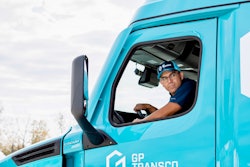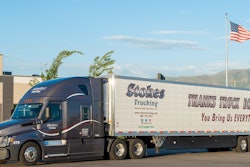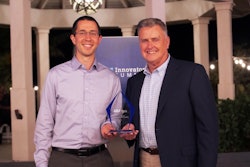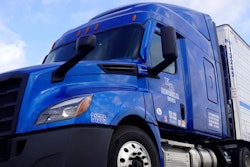
CCJ Innovators profiles carriers and fleets that have found innovative ways to overcome trucking’s challenges. If you know a carrier that has displayed innovation, contact CCJ Chief Editor Jason Cannon at [email protected] or 800-633-5953.
Assigning loads to drivers is an art of spinning plates, but the job of a freight dispatcher is fairly straightforward: to cover loads to the best of their ability.
That doesn't always match up with efficiency, as loads often find their way to drivers not best equipped to take them for various reasons that have nothing to do with selecting logistically the best available driver and pairing them with the logistically best load for that driver.
"That's not always what we as human beings think is the case," said Deen Albert, vice president of operations at Grand Island Express. "We get into, 'Well, you know this driver isn't a very hard runner, so maybe we shouldn't put him on that load' or, 'You know, I think I've got to do something else with this driver because he's got home time coming up' or something like that."
The 170-truck Nebraska-based reefer carrier has removed most of the human element of dispatch, layering Optimal Dynamics artificial intelligence with data gathered by the fleet's McLeod platform (order entry, driver events, like home time or if a truck needs to get back to the shop, breakdowns, and such).
"It takes the best driver for that load," Albert said of AI, "and that's not always the same guy."
The Optimial Dynamics AI platform removes any human bias by selecting logistically the best available driver and pairing it with the logistically best load for that driver. AI still considers important outlying factors, like upcoming home time, and maintenance needs of the equipment, it just doesn't weigh them like a human might.
"It sees the home time. It sees events and things like that, as long as our data input is correct," Albert said, "but it's pushing into that driver's hours more than we probably would to protect the home time. AI sees the opportunity and knows it's got a reasonable chance to make the home time, and it may dispatch on a load that we wouldn't even think about."
Albert said AI is also able to forecast and anticipate loads the carrier doesn't yet have "because it knows our patterns. It knows what to wait for. It may say, "Lay this driver over because you're going get this great load tomorrow.'"
That kind of foresight has enabled the Grand Island Express to plan loads up to four additional days in advance.
"It's planning out further, even even if we don't see it in the plan," Albert said. "It may dispatch a driver from Nebraska to Pennsylvania today, and that driver might be a Nebraska-based driver and has got home time coming up or something like that.
"But (the AI) knows that we've got a customer load there in Pennsylvania that's going to get us right back, so it's just anticipating the things that aren't even in the system yet," he said. "Being AI, it starts learning what our patterns are, what to look for, and also kind of factors in, 'Hey, what kind of rate are you getting on this? And is it helpful to wait on that, and should you lay over?'"
Machines are cold and unfeeling. AI doesn't care if Driver A is mad. It only cares about assigning the loads to Driver A that make the most sense under a defined set of circumstances. But, thus far, Albert said there's not been much for drivers to be mad about, and feedback (and, more importantly, results) has been positive.
"If you were one of those go-to drivers that that pretty much got whatever you asked for, you were probably a little bit disappointed going into it because, in your mind, to get the best miles and the best home time, you've got to take this load that goes here so you can get back," Albert said. "The driver's got a preconceived notion of what that week needs to look like, and AI changes that a little bit. It's going to make some different decisions. For those drivers that were those go-to drivers, it took some time for them to adjust to it. But I talked to one of those very drivers (in late March) and they said, 'Man, I just wanted to tell you, (AI) is making a difference right now.'"
Just because AI is efficient doesn't mean its always makes the best possible decision. While it is almost always a case of giving AI bad data, Albert said Grand Island does have a process to veto computer-based decisions.
"There's a dialogue that happens, and we really had to formalize that and make a very specific process for it," Albert said.
When a human decides that the AI-suggested load simply isn't going to work, Albert said they will manually dispatch it, but that is rare.
"As of (mid-April), about 93% of our decision-making is coming from Optimal Dynamics," he said.
AI only makes decisions that make sense based on the information it receives, and Albert noted the more information (and loads) that you put through it, the better it gets.
No more self-dispatch
Prior to AI, Grand Island Expressed used a load board, allowing drivers to select outbound loads. Albert said he spent years selling against that, noting drivers were better off working with a fleet manager to get the loads they want "because you can't be looking at the load board all the time."
"What we saw was the drivers that were using that load board were using it effectively" he said, "getting really good miles but also taking the primo loads in our network. The rest of the drivers had very few options that would work well for them to get the miles they needed."
AI, Albert said, spreads out opportunity.
"Maybe the 10% or 15% of drivers that were still using the load board we're getting close to 3,000 miles a week. Now we're seeing 85% of drivers," he said. "The floor raised, and these guys are still getting their miles, but they probably have to do a few things differently to get them."
Grand Island Express last year grew its fleet by 10%, and since implementing AI mid-year 2024 the carrier is handling 35% more loads than the prior year with no change in length of haul, and saw a greater than 13% increase in revenue per truck per week.
"You can't create results like that by continuing to dispatch the same way. So we knew that this was doing something," Albert said.
Not a human replacement
Among the fears of using AI is the loss of jobs, but Albert said Grand Island Express didn't go into the project seeking to eliminate anyone. Implementing AI has allowed managers to focus on tasks that require a human touch rather than scrambling to cover a load.
"Fleet managers aren't dispatching anymore. They're fleet managers, so they're handling the driver issues, the human interaction with our drivers," he said. "We kind of just repurposed those people as opposed to reduction."
The more you ask of AI the better it gets, so Albert has already set his sights on future fleet expansion without the need without increasing headcount.
"In the end, we, we handled that 35% more loads (in the last year) with one less person," Albert said, noting that an employee retired. "What we now see is scalability. We can very clearly see a path toward increasing our fleet and not having to add people because AI becomes a little bit more plug and play now."
The CCJ Innovators program is sponsored by Comdata, ExxonMobil, Fleetworthy and Mack Trucks.











